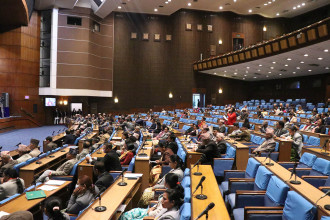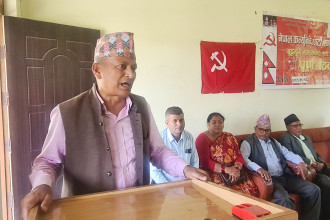-1721389892.jpg)
KATHMANDU: Deputy Prime Minister and Minister for Finance, Bishnu Prasad Paudel, has stated that Nepal's sovereign credit rating indicates a favourable environment for investment.
During his meeting with development partners at the Ministry of Finance (MoF) today, Minister Paudel highlighted the political and policy stability in the country following the formation of a coalition government, which includes the Nepali Congress and the CPN (UML). He expressed hope that this stability would boost the morale of the private sector and investors, leading to an increase in foreign investment in the country. "Since the formation of the incumbent government, the country's economic indicators are improving," he said.
The Finance Minister emphasised that the government is focused on creating an environment conducive to infrastructure development, human resource development, and private-sector investment. He noted that factors such as the current account balance, growth in electricity exports, increased remittances, and rising tourist arrivals have strengthened the nation's economy. "However, it is essential to diversify and expand our exports, which will help strengthen the external sector in the long run," he stressed.
Minister Paudel acknowledged the need for improvement in public investment, which has been hindered by reduced capital expenditure in recent years. To address this, the government has prioritised efforts to improve the quality of projects. He assured that there is no need to panic over public debt, adding that the government recognises the need to re-prioritise loan mobilisation.
The Minister also mentioned that a process has been initiated to draft an assistance mobilisation policy and law related to new finance mobilisation in the public sector, and he welcomed constructive suggestions from development partners.
Highlighting the government's emphasis on improving the public finance management system, Minister Paudel said the government is ready to collaborate with development partners on pressing issues such as climate change mitigation and adaptation, by adopting a flexible and integrated approach to public investment and building a green economy. "We have been facing some strain on maintaining public finance balance. Our investment in the infrastructure sector is contracting due to increases in some of our dedicated expenditures. The ratio of capital expenditure has decreased, especially due to our commitment to social security programmes and the increased cost of debt payment," he said, adding that Nepal's economic system is not without challenges.
He pointed out that resource mobilisation needs to be managed at the provincial and local levels, where there is significant demand, while the government also has the obligation to allocate budgets for strategic projects already in implementation.
Expressing commitment to executing a new revenue mobilisation strategy aimed at making revenue mobilisation sustainable, Minister Paudel said internal efforts alone are not sufficient to mobilise financial resources for all development initiatives. He stressed that development assistance is crucial for Nepal's fiscal management and urged development partners to pursue joint initiatives for effective and long-term results.
Representatives from development partner organisations expressed their readiness to support Nepal's economic development efforts and thanked the government for forming the High-level Economic Sector Reform Recommendation Commission. They noted that the results of the credit rating have further attracted foreign direct investment (FDI) in Nepal.
Representatives of the World Bank, Asian Development Bank, the United Nations Development Programme, and other development organisations were present at the meeting.
By RSS





-1745308675.jpg)
